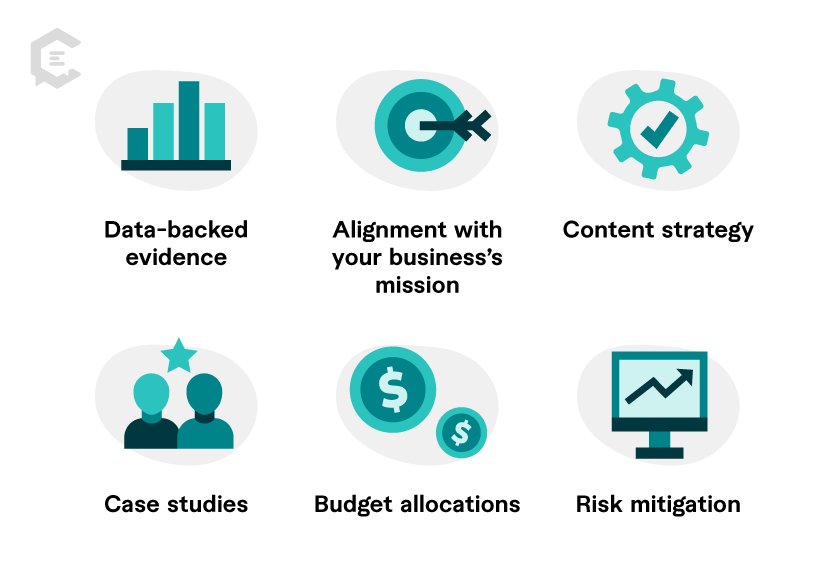What is a Business Case?
In the broad sense, a business case is a value proposition intended to convince a decision-maker to pursue a particular course of action.
In the content marketing world, you’ll likely find yourself having to build a business case to justify spending those precious marketing dollars on content when the ROI isn’t as immediate as traditional paid advertising. When pitching to executives on your content budget, having a strong business case is worth its weight in gold.

Why is Building a Business Case so Important?
If you’re here, you probably have at least some idea of how important content marketing is to your business. But depending on who the decision-makers in your business are, they might not totally understand the value of content marketing. They might not even be marketing people at all!
The fact is that 97% of businesses have generated positive results with content marketing, so if you want to be in that majority, you’ve got to get your team on board. And that means breaking out some numbers because the keepers of the purse strings are all about the numbers.
Content’s ROI is harder to track by itself. Can a blog post lead to a sale? Absolutely! But that’s not its primary function, and the data you present to support the investment should reflect that.

How Do You Build a Business Case for Content Marketing?
Before you start to build your case, there are a few things to take into consideration:
- Your audience. Understanding who you’re trying to target will help you determine what type of content to invest in, as well as how effective you’re being with that content.
- SEO value. Is your content in alignment with the current trends in SEO? Will your audience be able to find your content?
- Organic vs. paid distribution. You may have different paths of delivery to intended audiences based on the types of content being developed, the delivery platforms, and the intended customer journey. How you deliver your content will affect how you create it.
Beyond that, you’ll want to choose an effective strategy for presenting the case, depending on the type of decision-maker you’ll be dealing with. Which of these methods is most likely to resonate with your executive team?

- Data-backed evidence: Do everything you can to weave in eye-catching statistics highlighting the potential for increased ROI and conversions. You can highlight the fact that content marketing often delivers a higher ROI than traditional advertising.
- Alignment with your business’s mission: Communicate how your content marketing strategy would align with your brand’s overall mission.
- Content strategy: Present a comprehensive plan that outlines the target audiences, types of content, and distribution channels. If you need help, use our guide on developing a high-performing content marketing strategy.
- Case Studies: Share success stories from companies that have achieved significant results through content marketing, and connect their success to how you plan to implement a similar strategy.
- Budget allocation: Provide a detailed breakdown of the budget costs, explain how they will be allocated, and discuss potential project returns.
- Risk mitigation: Think of any potential concerns or objections beforehand. Be ready with strong answers that anticipate those concerns and turn them to your advantage.

Let’s Break it Down Even More
We sure can! Getting your stakeholders on board with your content plan is more than just numbers — it’s about painting a clear picture of the impact quality content can have, even within tight budgets, and being prepared for those tough questions.
We’ve put together a workbook to prepare you and discuss how to secure stakeholder buy-in for your content marketing strategy. It will also help you:
- Understand and connect with all stakeholders, whether they’re already on board or need more convincing.
- Link your content strategy directly to the company’s broader objectives.
- Use storytelling and visuals to communicate and truly resonate with each stakeholder.
- Face tough questions with confidence, armed with solid answers and strategies.
Develop Your Content Strategy with ClearVoice
Every business has different needs (and decision-makers!), which is why ClearVoice creates a custom content plan to address your specific needs and work with your resources. You’ll never pay for content you don’t need or won’t use. When you work with one of our content specialists, we’ll create a data-backed plan to help you create high-quality content that reaches your target audience and ultimately converts.
Make a clear case with ClearVoice. Talk to a content specialist today!



